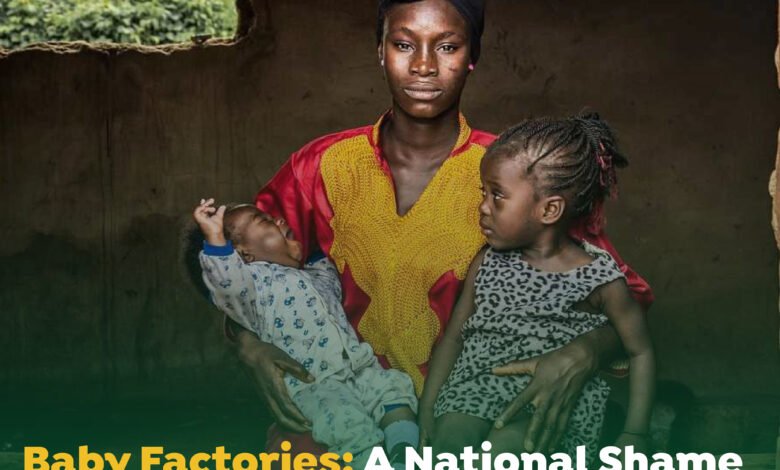
Soole, a movie by Nollywood star Adunni Ade, sheds a harsh light on the horrific reality of baby factories in Nigeria. These factories, disguised as maternity homes or orphanages, exploit vulnerable young women and traffic infants.
Despite efforts to contain them, baby factories continue to operate, inflicting physical and psychological scars on countless victims.
A Growing National Crisis
The recent raid in Abia in Umuahia North Local Government by the Department of State Services (DSS), where 10 young women were rescued, is just the latest grim reminder of this escalating issue.
According to a 2023 report by the National Agency for the Prohibition of Trafficking in Persons (NAPTIP), over 200 baby factories have been busted nationwide in the past five years. This number likely represents only a fraction of the true scope of the problem, as many factories remain undetected.
Baby factories, also known as child harvesting rings, exploit a dark underbelly within the Nigerian adoption system and maternity care. Many operate under the guise of legitimate maternity homes, orphanages, or clinics, making them difficult to identify and dismantle. Fisayo Soyombo’s award-winning undercover investigation in 2022, which exposed the “Arrow of God Orphanage” selling infants for N1.5 million, exemplifies the disturbing lengths these factories go to conceal their crimes.
Causes and effects of upsurge in baby factories in Nigeria
The causes of this national shame are multifaceted. Poverty is undeniably a major driver. The World Bank says poverty rate in Nigeria has increased to 46 percent in 2023, representing 104 million poor Nigerians.. This desperate situation makes young women vulnerable to the false promises and manipulations of baby factory operators. The case of 20-year-old Chioma Fidelis who sold her newborn son for a paltry N200,000 due to hunger and hardship as reported in July 2017 by PUNCH exemplifies the tragic link between poverty and exploitation.
The tedious process of adopting a child is also fingered as another factor leading to baby factories.
. “There are a lot of procedures for adopting in orphanages; you’ll go to social welfare and several other ministries and then sign a series of documents. But this one, they will just come, pay, take the baby, and go,” Maymunah Yusuf Kadiri, a neuropsychiatrist/mental health expert, said.
Combating the Monster
Experts acknowledge that existing laws against child trafficking are sufficient, but enforcement remains a critical challenge. Lawyer Philomena Nneji, Chairperson of the International Federation of Women Lawyers, emphasizes the need for “an enhanced enforcement mechanism” to ensure these laws have teeth.
However, dismantling baby factories requires a more comprehensive approach. Streamlining the adoption process to make it less cumbersome and bureaucratic could be a crucial step. Additionally, social programs aimed at alleviating poverty, particularly among young women, could help address the root causes of this issue.
The United Nations Office on Drugs and Crime (UNODC) reports that child trafficking is a global phenomenon, generating billions of dollars annually for criminal organizations.
Though Nigeria is not alone in its struggle against child trafficking, the continued existence of baby factories is a stain on the country’s national conscience.
The need for more concerted efforts toward dismantling these criminal enterprises in order to break the cycle of abuse and offer hope for a brighter future cannot be overemphasized.





